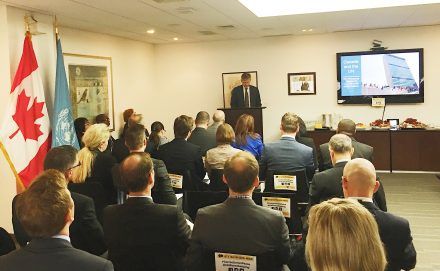Raising awareness of the role of corrections in peace operations

On 5 and 6 June, PRI’s Policy Director Andrea Huber attended the annual meeting of the Group of Friends of Corrections in Peace Operations (GoF), which was hosted by the Permanent Mission of Canada to the United Nations. The GoF is a United Nations Member States-driven initiative, which provides expert advice and support on correctional issues to the Department of Peacekeeping Operations (DPKO). The GoF is currently chaired by Canada, and the chairmanship will be taken over by Burkina Faso in February 2018.
A high-level event on day one explored the linkages between a robust prison security framework in host countries of United Nations peace operations and the broader peace and security agenda of the Security Council. The second day focused on the GoF’s priorities and upcoming activities. The event attracted approximately 40 representatives from Member States, United Nations partners, think tanks and non-governmental organisations.

Under-Secretary-General for Peacekeeping Operations, Jean-Pierre Lacroix
In his opening remarks, Under-Secretary-General for Peacekeeping Operations, Jean-Pierre Lacroix, explained how the safe, secure and humane detention of violent offenders – including potential spoilers to peace processes and members of extremist groups – can significantly contribute to public safety in host countries of United Nations peace operations, while helping to build the trust of the population. He emphasised that strong and coordinated support to police, justice and corrections institutions is required as ‘the linkages between terrorism, conflict and the rule of law are clear’.
Marcien Kpatamango, acting Chargé d’Affaires of the Permanent Mission of the Central African Republic to the United Nations, pointed out that an effective and fair criminal justice system is required to break cycles of impunity and violence. He said that ‘[t]he rule of law cannot be upheld without a functioning prison system [that] contributes to the safety of all citizens by ensuring that the orders of the judiciary are executed in a fair, transparent and professional way.’
Speakers also emphasised that dire prison conditions in post-conflict settings are particularly conducive to the radicalisation of individuals by extremist groups, as inmates often turn to other prisoners for protection and support, rendering them easy targets for recruitment. Cindy Smith, Director of the United Nations Interregional Crime and Justice Research Institute (UNICRI), concluded that the best way to prevent radicalisation in resource-low contexts is to focus on the provision of a safe and secure environment for prisoners.
The Deputy Director-General of the Rwanda Correctional Service, Chantal Ujeneza, underlined the need to respect the rights of all prisoners, including women, and illustrated how gender mainstreaming in prisons is recognised as an essential element of Rwanda’s peacebuilding strategy. Other speakers included Ambassador Michael Grant, the Deputy Permanent Representative of Canada, Martin Gillå, Head of the Office for International Affairs of the Swedish Prison and Probation Service, and Ingrid Jeunhomme of DPKO, former Chief of the United Nations Multidimensional Integrated Stabilization Mission in the Central African Republic (MINUSCA) Corrections Unit.
More Information
Click here to read our expert blog on Women, gender-specific abuse and peacekeeping operations.
Read PRI’s 2015 report, Preventing radicalisation in prisons – developing a coordinated and effective approach.